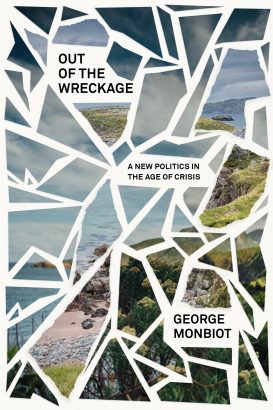 MLF Chapter & Verse
MLF Chapter & Verse
The Manchester Literature Festival Blog
Review: George Monbiot
Young Digital Reporter Joe Fenn reports on our sell-out event with author and journalist George Monbiot
As the audience slowly seeps into Manchester’s grand Dancehouse Theatre, eventually to fill practically all of the more than four hundred seats, faintly in the background float the quiet, Dylan-esque twangs of an indiscernible singer-songwriter. When the audience has settled and the music quietened, the night is introduced and we learn, to the surprise of at least this reporter, that the songs which played us in were written, in part, by tonight’s speaker, the author, ecologist, and Guardian columnist George Monbiot (the t is silent). They are part of a concept album not far removed, in terms of subject matter, from the talk Monbiot will give tonight. This is typical of Monbiot’s work; the varied subjects to which he applies himself, from political campaigning to otter populations, are all seen and explained to be interconnected, all part of a complex web which spreads across all of modern life.
With everybody settled and introduced, Monbiot dives straight into this web, launching into a fast-paced, hour-long run down of the skeleton ideas from his most recent book, Out of the Wreckage. In brief, Monbiot tells his audience a story about stories; we are, Monbiot holds, ‘creatures of narrative’, using stories to explain and understand our world much more readily and effectively than we use statistics or detached analysis. Nowhere is this more true than in politics, where overarching narratives inform decision-making at every level, and it is a failure of political narrative which has left us stagnant for almost a decade. The narrative of neo-liberalism remains dominant, although its basic tenets ‘crashed and burned’ in the 2008 crisis, because there is, as yet, no alternative offered. ‘Only story can replace story’, Monbiot says, and it is a new story which we are sorely lacking.
The rest of Monbiot’s talk is dedicated to beginning to write such a story, one centred on what Monbiot considers our defining trait; extreme altruism. Humans are naturally inclined from the youngest age towards altruism which far exceeds that of other species, and it is around this trait that we should develop the new character of the human, replacing the selfish and competitive character of the Homo Economicus on which the neoliberal story is built. Around this new character we can then craft a whole new political story.
How well this might work is, obviously, too much to talk of here, but if one needs convincing of the existence of human altruism a talk by George Monbiot is a good place to start. Anyone who has read Monbiot will know of the optimism and warmth which shines through his writing, and what Naomi Klein has called his ‘relentless faith in people’. Monbiot is humble and sincere throughout his talk, and when taking questions is genuinely engaged and thankful to those who ask them, going as far as requesting that the first two questions come from individuals who have never spoken up at such an event in the past. After questions, he spends more than half an hour signing books on stage, and then insists that all those still present join him in the pub across the road afterwards, to continue the discussion and begin building community from the most basic level up. When a group of forty strangers all start buying pints for one another in the pub, one begins to agree with Monbiot that humans may not be as selfish as some political think tanks would have us believe.
